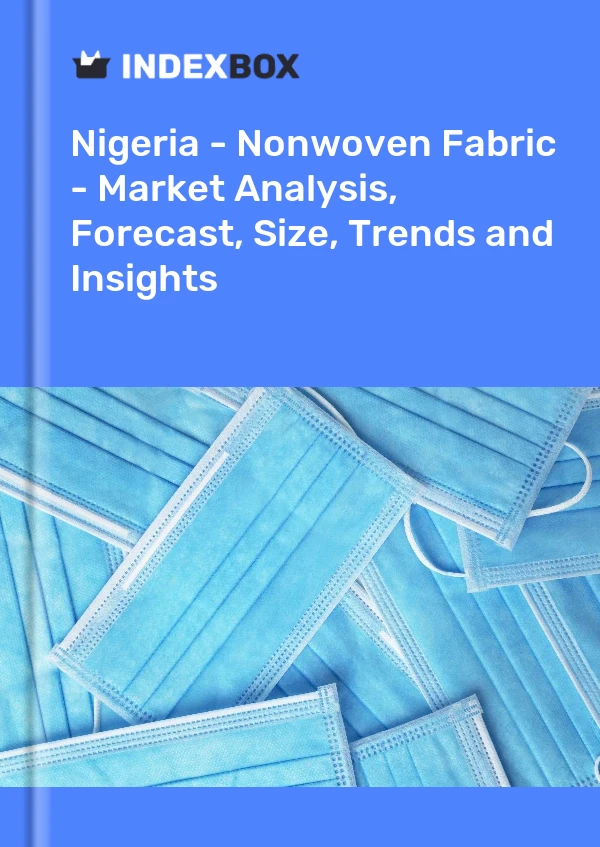
Nigeria - Nonwoven Fabric - Market Analysis, Forecast, Size, Trends and Insights
Get instant access to more than 2 million reports, dashboards, and datasets on the IndexBox Platform.
View PricingNonwoven Fabric Price in Nigeria - 2022
Contents:
- Nonwoven Fabric Price in Nigeria (CIF) - 2022
- Nonwoven Fabric Price in Nigeria (FOB) - 2022
- Nonwoven Fabric Imports in Nigeria
- Nonwoven Fabric Exports in Nigeria
Nonwoven Fabric Price in Nigeria (CIF) - 2022
In 2022, the average nonwoven fabric import price amounted to $2,198 per ton, shrinking by -2.7% against the previous year. In general, import price indicated a notable expansion from 2012 to 2022: its price increased at an average annual rate of +2.8% over the last decade. The trend pattern, however, indicated some noticeable fluctuations being recorded throughout the analyzed period. Based on 2022 figures, nonwoven fabric import price decreased by -42.7% against 2017 indices. The growth pace was the most rapid in 2014 when the average import price increased by 52%. Over the period under review, average import prices attained the maximum at $3,832 per ton in 2017; however, from 2018 to 2022, import prices failed to regain momentum.
Prices varied noticeably by country of origin: amid the top importers, the country with the highest price was Bolivia ($5,826 per ton), while the price for Hong Kong SAR ($609 per ton) was amongst the lowest.
From 2012 to 2022, the most notable rate of growth in terms of prices was attained by Egypt (+2.9%), while the prices for the other major suppliers experienced more modest paces of growth.
Nonwoven Fabric Price in Nigeria (FOB) - 2022
The average nonwoven fabric export price stood at $5,591 per ton in 2022, therefore, remained relatively stable against the previous year. Overall, export price indicated a strong increase from 2012 to 2022: its price increased at an average annual rate of +6.9% over the last decade. The trend pattern, however, indicated some noticeable fluctuations being recorded throughout the analyzed period. Based on 2022 figures, nonwoven fabric export price decreased by -29.7% against 2019 indices. The most prominent rate of growth was recorded in 2014 when the average export price increased by 63%. The export price peaked at $7,952 per ton in 2019; however, from 2020 to 2022, the export prices stood at a somewhat lower figure.
There were significant differences in the average prices for the major foreign markets. In 2022, amid the top suppliers, the country with the highest price was Poland ($7,533 per ton), while the average price for exports to North Macedonia ($2,030 per ton) was amongst the lowest.
From 2012 to 2022, the most notable rate of growth in terms of prices was recorded for supplies to Turkey (+37.0%), while the prices for the other major destinations experienced more modest paces of growth.
Nonwoven Fabric Imports in Nigeria
After three years of growth, supplies from abroad of nonwoven fabrics decreased by -54.2% to 15K tons in 2022. Over the period under review, imports continue to indicate a perceptible descent. The most prominent rate of growth was recorded in 2020 with an increase of 86% against the previous year.
In value terms, nonwoven fabric imports fell dramatically to $34M in 2022. Overall, imports continue to indicate a abrupt decrease. The pace of growth appeared the most rapid in 2020 with an increase of 77% against the previous year. As a result, imports reached the peak of $77M. From 2021 to 2022, the growth of imports remained at a somewhat lower figure.
| Import of Nonwoven Fabric in Nigeria (Million USD) | |||||
|---|---|---|---|---|---|
| COUNTRY | 2019 | 2020 | 2021 | 2022 | CAGR, 2019-2022 |
| Egypt | 16.5 | 30.9 | 23.0 | 9.1 | -18.0% |
| Italy | 4.8 | 5.7 | 7.0 | 5.0 | 1.4% |
| China | 3.1 | 12.0 | 10.5 | 4.9 | 16.5% |
| Bolivia | 2.4 | 4.5 | 3.8 | 2.1 | -4.4% |
| Turkey | 3.2 | 1.2 | 4.4 | 2.0 | -14.5% |
| Germany | 1.8 | 3.0 | 1.9 | 1.9 | 1.8% |
| Hong Kong SAR | 1.5 | 2.9 | 2.5 | 1.3 | -4.7% |
| Israel | 1.7 | 3.0 | 2.8 | 0.9 | -19.1% |
| India | 0.2 | 0.4 | 1.7 | 0.8 | 58.7% |
| Czech Republic | 0.6 | 0.8 | 1.5 | 0.7 | 5.3% |
| Saudi Arabia | 1.0 | 1.7 | 1.3 | 0.6 | -15.7% |
| France | 0.6 | 0.9 | 0.7 | 0.5 | -5.9% |
| Others | 5.9 | 9.5 | 14.4 | 3.8 | -13.6% |
| Total | 43.4 | 76.7 | 75.4 | 33.6 | -8.2% |
Top Suppliers of Nonwoven Fabric to Nigeria in 2022:
- China (4.1K tons)
- Egypt (3.5K tons)
- Hong Kong SAR (2.2K tons)
- Italy (1.1K tons)
- Turkey (0.8K tons)
- Israel (0.6K tons)
- France (0.5K tons)
- Germany (0.4K tons)
- Bolivia (0.4K tons)
- India (0.3K tons)
- Saudi Arabia (0.2K tons)
- Czech Republic (0.2K tons)
Nonwoven Fabric Exports in Nigeria
In 2022, exports of nonwoven fabrics from Nigeria declined modestly to 1.5 tons, with a decrease of -4.9% compared with the previous year. Overall, exports showed a abrupt descent. The pace of growth was the most pronounced in 2021 with an increase of 4.8% against the previous year.
In value terms, nonwoven fabric exports contracted to $8.6K in 2022. In general, exports saw a abrupt shrinkage. The pace of growth appeared the most rapid in 2021 with an increase of 4.7% against the previous year.
| Export of Nonwoven Fabric in Nigeria (Thousand USD) | |||||
|---|---|---|---|---|---|
| COUNTRY | 2019 | 2020 | 2021 | 2022 | CAGR, 2019-2022 |
| Poland | 6.9 | 4.8 | 4.2 | 5.0 | -10.2% |
| Cote d'Ivoire | 3.1 | 2.1 | 2.3 | 3.2 | 1.1% |
| North Macedonia | 0.5 | 0.4 | 0.3 | 0.4 | -7.2% |
| Benin | N/A | 1.3 | 1.7 | N/A | 30.8% |
| China | 3.6 | N/A | N/A | N/A | 0% |
| Brazil | N/A | N/A | 0.3 | N/A | 0% |
| Others | 0.2 | 0.1 | 0.3 | N/A | 22.5% |
| Total | 14.4 | 8.7 | 9.1 | 8.6 | -15.8% |
Top Export Markets for Nonwoven Fabric from Nigeria in 2022:
- Cote d'Ivoire (686.0 kg)
- Poland (668.0 kg)
- North Macedonia (192.0 kg)
This report provides an in-depth analysis of the nonwoven fabric market in Nigeria. Within it, you will discover the latest data on market trends and opportunities by country, consumption, production and price developments, as well as the global trade (imports and exports). The forecast exhibits the market prospects through 2030.
Product coverage:
- Prodcom 13951010 - Non-wovens of a weight . .25 g/m. (including articles made from non-wovens) (excluding articles of apparel, coated or covered)
- Prodcom 13951020 - Non-wovens of a weight of > .25 g/m. but . .70 g/m. (including articles made from non-wovens) (excluding articles of apparel, coated or covered)
- Prodcom 13951030 - Non-wovens of a weight of > .70 g/m. but . .150 g/m. (including articles made from non-wovens) (excluding articles of apparel, coated or covered)
- Prodcom 13951050 - Non-wovens of a weight of > .150 g/m. (including articles made from non-wovens) (excluding articles of apparel, coated or covered)
- Prodcom 13951070 - Non-wovens, coated or covered (including articles made from non-wovens) (excluding articles of apparel)
Country coverage:
- Nigeria
Data coverage:
- Market volume and value
- Per Capita consumption
- Forecast of the market dynamics in the medium term
- Trade (exports and imports) in Nigeria
- Export and import prices
- Market trends, drivers and restraints
- Key market players and their profiles
Reasons to buy this report:
- Take advantage of the latest data
- Find deeper insights into current market developments
- Discover vital success factors affecting the market
This report is designed for manufacturers, distributors, importers, and wholesalers, as well as for investors, consultants and advisors.
In this report, you can find information that helps you to make informed decisions on the following issues:
- How to diversify your business and benefit from new market opportunities
- How to load your idle production capacity
- How to boost your sales on overseas markets
- How to increase your profit margins
- How to make your supply chain more sustainable
- How to reduce your production and supply chain costs
- How to outsource production to other countries
- How to prepare your business for global expansion
While doing this research, we combine the accumulated expertise of our analysts and the capabilities of artificial intelligence. The AI-based platform, developed by our data scientists, constitutes the key working tool for business analysts, empowering them to discover deep insights and ideas from the marketing data.
-
1. INTRODUCTION
Making Data-Driven Decisions to Grow Your Business
- REPORT DESCRIPTION
- RESEARCH METHODOLOGY AND AI PLATFORM
- DATA-DRIVEN DECISIONS FOR YOUR BUSINESS
- GLOSSARY AND SPECIFIC TERMS
-
2. EXECUTIVE SUMMARY
A Quick Overview of Market Performance
- KEY FINDINGS
- MARKET TRENDS This Chapter is Available Only for the Professional Edition PRO
-
3. MARKET OVERVIEW
Understanding the Current State of The Market and Its Prospects
- MARKET SIZE
- MARKET STRUCTURE
- TRADE BALANCE
- PER CAPITA CONSUMPTION
- MARKET FORECAST TO 2030
-
4. MOST PROMISING PRODUCT
Finding New Products to Diversify Your Business
This Chapter is Available Only for the Professional Edition PRO- TOP PRODUCTS TO DIVERSIFY YOUR BUSINESS
- BEST-SELLING PRODUCTS
- MOST CONSUMED PRODUCT
- MOST TRADED PRODUCT
- MOST PROFITABLE PRODUCT FOR EXPORT
-
5. MOST PROMISING SUPPLYING COUNTRIES
Choosing the Best Countries to Establish Your Sustainable Supply Chain
This Chapter is Available Only for the Professional Edition PRO- TOP COUNTRIES TO SOURCE YOUR PRODUCT
- TOP PRODUCING COUNTRIES
- TOP EXPORTING COUNTRIES
- LOW-COST EXPORTING COUNTRIES
-
6. MOST PROMISING OVERSEAS MARKETS
Choosing the Best Countries to Boost Your Exports
This Chapter is Available Only for the Professional Edition PRO- TOP OVERSEAS MARKETS FOR EXPORTING YOUR PRODUCT
- TOP CONSUMING MARKETS
- UNSATURATED MARKETS
- TOP IMPORTING MARKETS
- MOST PROFITABLE MARKETS
7. PRODUCTION
The Latest Trends and Insights into The Industry
- PRODUCTION VOLUME AND VALUE
8. IMPORTS
The Largest Import Supplying Countries
- IMPORTS FROM 2012–2023
- IMPORTS BY COUNTRY
- IMPORT PRICES BY COUNTRY
9. EXPORTS
The Largest Destinations for Exports
- EXPORTS FROM 2012–2023
- EXPORTS BY COUNTRY
- EXPORT PRICES BY COUNTRY
-
10. PROFILES OF MAJOR PRODUCERS
The Largest Producers on The Market and Their Profiles
This Chapter is Available Only for the Professional Edition PRO -
LIST OF TABLES
- Key Findings In 2023
- Market Volume, In Physical Terms, 2012–2023
- Market Value, 2012–2023
- Per Capita Consumption In 2012-2023
- Imports, In Physical Terms, By Country, 2012–2023
- Imports, In Value Terms, By Country, 2012–2023
- Import Prices, By Country Of Origin, 2012–2023
- Exports, In Physical Terms, By Country, 2012–2023
- Exports, In Value Terms, By Country, 2012–2023
- Export Prices, By Country Of Destination, 2012–2023
-
LIST OF FIGURES
- Market Volume, In Physical Terms, 2012–2023
- Market Value, 2012–2023
- Market Structure – Domestic Supply vs. Imports, In Physical Terms, 2012-2023
- Market Structure – Domestic Supply vs. Imports, In Value Terms, 2012-2023
- Trade Balance, In Physical Terms, 2012-2023
- Trade Balance, In Value Terms, 2012-2023
- Per Capita Consumption, 2012-2023
- Market Volume Forecast to 2030
- Market Value Forecast to 2030
- Products: Market Size And Growth, By Type
- Products: Average Per Capita Consumption, By Type
- Products: Exports And Growth, By Type
- Products: Export Prices And Growth, By Type
- Production Volume And Growth
- Exports And Growth
- Export Prices And Growth
- Market Size And Growth
- Per Capita Consumption
- Imports And Growth
- Import Prices
- Production, In Physical Terms, 2012–2023
- Production, In Value Terms, 2012–2023
- Imports, In Physical Terms, 2012–2023
- Imports, In Value Terms, 2012–2023
- Imports, In Physical Terms, By Country, 2023
- Imports, In Physical Terms, By Country, 2012–2023
- Imports, In Value Terms, By Country, 2012–2023
- Import Prices, By Country Of Origin, 2012–2023
- Exports, In Physical Terms, 2012–2023
- Exports, In Value Terms, 2012–2023
- Exports, In Physical Terms, By Country, 2023
- Exports, In Physical Terms, By Country, 2012–2023
- Exports, In Value Terms, By Country, 2012–2023
- Export Prices, By Country Of Destination, 2012–2023
This report provides an in-depth analysis of the nonwoven fabric market in Nigeria.
This report provides an in-depth analysis of the global nonwoven fabric market.
This report provides an in-depth analysis of the nonwoven fabric market in Nigeria.
This report provides an in-depth analysis of the global nonwoven fabric market.
During the pandemic, increased demand for facemasks and medical textiles accelerated the growth in global nonwoven fabric exports. China remains the largest supplier of the product worldwide. By 2030, the market for nonwovens should expand to 13M tons driven by the recovering demand from the construction, manufacturing and agricultural sectors as well as continued high consumption rates in the medical industry.
In 2016, the amount of nonwoven textile imported worldwide stood at X tons, increasing by X% against the previous year figure. The total import volume increased at an average annual rate of +X>
In 2016, the amount of nonwoven textile imported worldwide stood at X tons, increasing by X% against the previous year figure. The total import volume increased at an average annual rate of +X>
China has become the leader in the global nonwoven textile trade. In 2014, China exported X thousand tons of nonwoven textiles, totaling X billion USD, X% over the previous year. Its primary trading partner was the U.S., where it supplied X%
During the pandemic, increased demand for facemasks and medical textiles accelerated the growth in global nonwoven fabric exports. China remains the largest supplier of the product worldwide. By 2030, the market for nonwovens should expand to 13M tons driven by the recovering demand from the construction, manufacturing and agricultural sectors as well as continued high consumption rates in the medical industry.
In 2016, the amount of nonwoven textile imported worldwide stood at X tons, increasing by X% against the previous year figure. The total import volume increased at an average annual rate of +X>
In 2016, the amount of nonwoven textile imported worldwide stood at X tons, increasing by X% against the previous year figure. The total import volume increased at an average annual rate of +X>
China has become the leader in the global nonwoven textile trade. In 2014, China exported X thousand tons of nonwoven textiles, totaling X billion USD, X% over the previous year. Its primary trading partner was the U.S., where it supplied X%











































